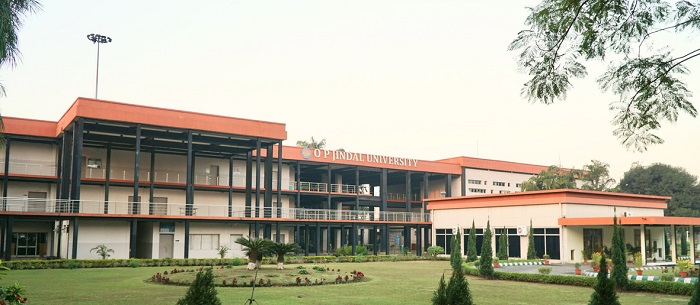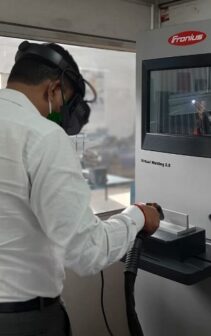“In my view, the robust industry-university collaboration will have a multi-fold impact on reducing unemployment, social upliftment, and the nation’s progress by ushering in skill development, innovation, and entrepreneurship”, says Dr. R D Patidar, Vice-Chancellor, OP Jindal University.
Building a constructive framework for industry-academia collaborations and partnerships is essential to building a globally competitive skilled workforce. Successful industry-academia collaborations are crucial to move towards the goal of making India, an innovation hub for the world.

To talk about industry-academia collaborations in India, the positive impact they are creating, how these collaborations are also creating an environment of entrepreneurship, innovation, and transformation, NSN has started an interview series in partnership with Fronius India. As part of this, we conversed with Dr. R D Patidar, Vice-Chancellor, OP Jindal University. Know more about the collaboration between OP Jindal University and Fronius India from excerpts from our conversation…
Q: Please tell us about your association with Fronius India?
A: It all started in the year 2017 during the technical survey report related to a white paper prepared by OP Jindal University for a Confederation of Indian Industry (CII) conference on ‘Weld 4.0: Intelligentized Welding in India’. We came to know about Fronius India Private Limited, its global presence, and technology readiness in the field of Weld 4.0. As our University is surrounded by several steel industries including our parent organization Jindal Steel & Power Limited (JSPL), we established a Centre for Steel Technology and Product Development (CSTPD) at our campus, to impart our students all the skills which can cater to the needs of the steel industry.
As we know, welding is an integral part of the steel industry, so it becomes an important vertical of the Centre for Steel Technology & Product Development. So, we signed an MoU with Fronius India Private Limited (FIPL) to establish a Center of Excellence in Welding Technology (CoEWT) at the MoU signing ceremony of India Steel 2019. The ceremony was held under the Chairmanship of Secretary, Ministry of Steel, Government of India along with other dignitaries from the Ministry and Industry (https://www.indiasteelexpo.in/pdf/2019/PostShow2019.pdf). They have participated in our Industry-Academia conclaves and trained our students to be ready for industries.
The primary objective of the center is to bridge the technological gap between industry requirements and academic curriculum. The center is having a focus on training and research programs that will help in catering to the growing demand from engineering and manufacturing industries in India. The center is providing training to undergraduate, postgraduate, polytechnic, and vocational school students to meet industry requirements, bridging the industry-academia gap and enhancing the competency levels of students for better employability. In addition to this, the center will train faculty members of all nearby engineering colleges and provide industrial training to MSMEs of the region.
Q: How Fronius helped your institution in building the industry-academia connect?
A: Fronius India is committed to developing the skills of youth and has already established advanced welding centers in IITs, NITs, and other universities. That is why we approached them for establishing the advanced welding center at our campus. They have helped us in all respects right from establishing the center, developing training modules to train our faculty and staff.
Our association with them has been really fruitful as they have connected us with more than 50 industries, particularly the industries working in the field of electric vehicles, advanced welding technologies, and other esteemed organizations/bodies involved in skilling India. These industry-academia connections helped us to get a special mention for Best Industry Linked Institutes during the 9th AICTE-CII award 2020.
We have a group of students in our University called Team Solaric, who have designed and fabricated a Solar Electric Vehicle, participated in the Electric Solar Vehicle Championship (ESVC), and also owned the Hero Electric Spirit Award. Fronius India provided all the technical support related to the welding of vehicle chassis and gave support in battery charging infrastructure.

Q: With the sudden disruption in the skills delivery across the nation, how do you perceive training on simulators and virtual training for your students from Engineering and Technology streams?
A: Digital technology is an integrated part of education and it is now more visible across all the verticals. Contents on-the-go and simulation-based training is a highly effective way of transferring key skills to trainees in a cost-effective manner. It provides an optimum way for teachers to assess how well their students are putting skills into practice and the decisions they are making in front of simulated real-life situations. Learning in a safe and managed environment provides essential hands-on experience that integrates key theoretical concepts with interactive, computer-simulated situations.
You can track your learners’ progress and performance, pull up detailed analytics reports and get a complete bird’s eye view of their progress throughout the session. For example, our state-of-the-art welding technology center equipped with Weldcube of Fronius India is very much effective to train the welders as per industry standards. Virtual Welding set up helps the trainees to understand the principles of welding step by step on common workpieces and practice without any risk of injury.
Related article: Why Industry-academia collaborations are instrumental in leading the country towards innovation – Read more: https://nationalskillsnetwork.in/why-industry-academia-collaborations-are-instrumental-in-leading-the-country-towards-innovation/
 Q: How important is industry-academia collaborations in staying relevant during the changing times?
Q: How important is industry-academia collaborations in staying relevant during the changing times?
A: In this fast-changing technology-driven era, a collaboration between academia and industry is increasingly a critical component of efficient innovation systems. In my view, the robust industry-university collaboration will have a multi-fold impact on reducing unemployment, social upliftment, and the nation’s progress by ushering in skill development, innovation, and entrepreneurship.
Universities need to upgrade their curriculum as per industry requirements and at the same time, Industries need new ideas to maintain their competitiveness to cater to the new challenges they face. Thus, academia and industries share a supplier-customer relationship. But optimum benefits from this can be extracted only when there is an efficient collaboration between industry and university.
Q: Please share some insights on the role of industry in preparing industry-ready curriculum, workplace exposure through internships and apprenticeships.
A: While talking about industry-academia connect, I am primarily emphasizing designing of the courses and curriculum as per the requirement of the industry, because the majority of the recruiters look for job-ready candidates and educational institutes are fast-adopting courses and curriculum that meet industry needs. At OP Jindal University we have involved people from nearly 35+ reputed industries/organizations, in our Industry Advisory Board and all are at key positions in their industries.
We take their inputs before designing and updating the course curriculum. We have introduced courses like Introduction to Stainless Steel, Solar Energy Technology, Weld 4.0, Industry 4.0, Data Mining, Artificial Intelligence, Machine Learning, etc. in our curriculum to keep our students one step ahead. In the past, we have organized four Industry-Academia Conclaves, where we have invited people from reputed organizations to share their idea and to understand their needs.
Apart from the curriculum, I feel that the internships and apprenticeships which come under the domain of experiential learning play a vital role in preparing a job-ready workforce. Experiential Learning provides students with direct experience through which they can use analytical skills and reflection to apply new ideas gained from the experience of their classroom learning. Experiential learning is a more vital component because only the dialogues made on certain platforms are not going to work. I have already mentioned the Industry-Academia Conclave, which we organized to understand the need of industries. It has not only helped us in updating our course curriculum but also in getting long-term (six months) internships for our students. Some of these internships have also converted into job offers.
Q: Are there any other points you wish to share?
A: I would like to thank National Skill Network for creating an ecosystem for skill development and Entrepreneurship. I think it is a great initiative by NSN to bring the industries and academia to a common platform to share their works and initiatives for skill development to fulfill the vision of the Honourable Prime minister to create an “Atamnirbhar Bharat”. I would like to mention here that this year we are organizing National Innovation Fest (NIF 2021) to create awareness among rural youth about skill development programmes and Innovations under our special purpose vehicle “OPJU Innovation Centre”.













